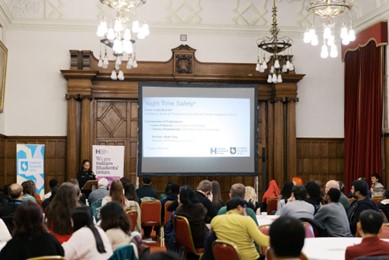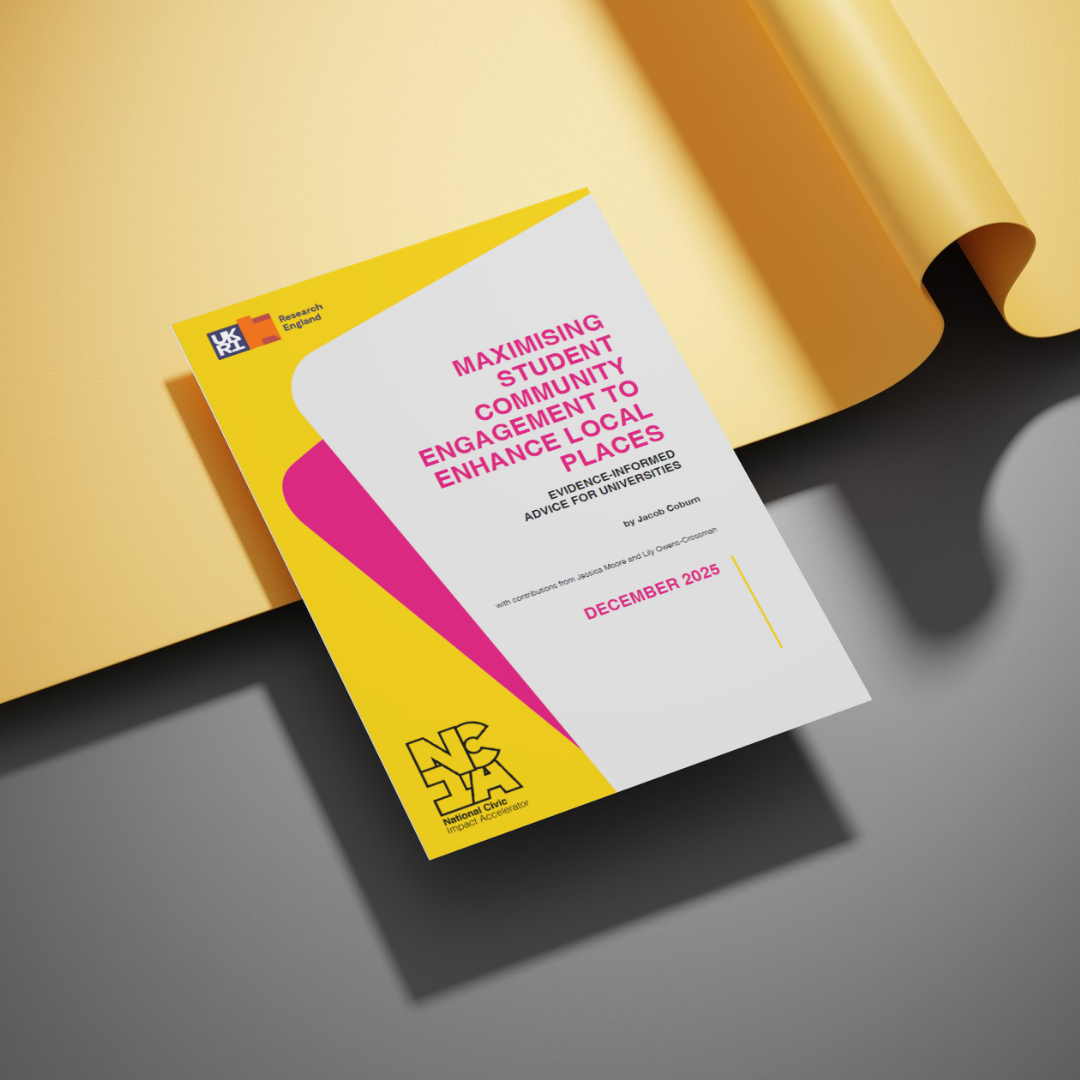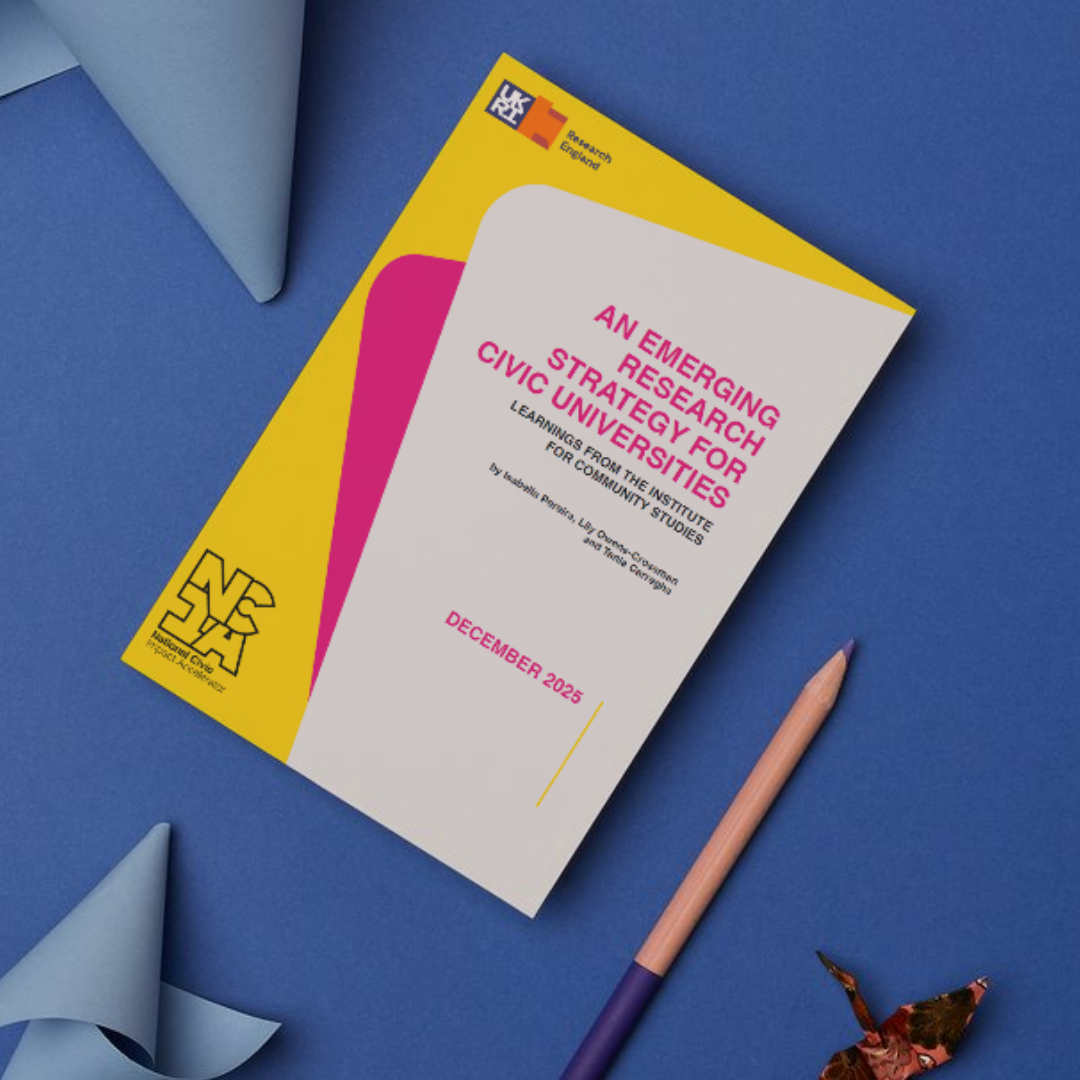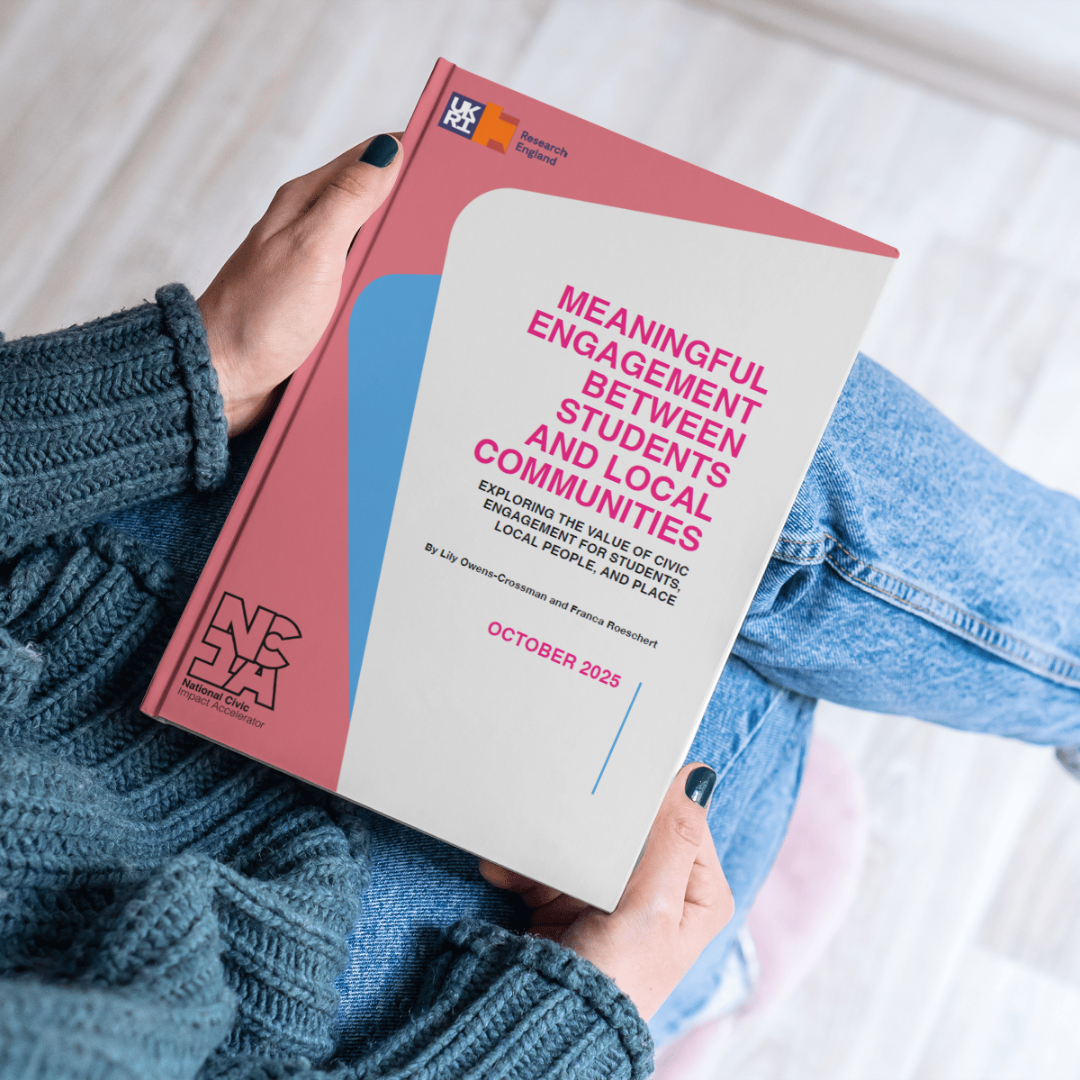Our Story & Mission
The NCIA's vision is to increase the connectivity, momentum, and effectiveness of the HE sector's civic activities for local societal, economic, and environmental benefit and maximise the contribution universities can make towards addressing societal challenges and responding to policy priorities. We will do this by:
- rapidly prioritising, generating and mobilising intelligence about place-based working
- unlocking leadership potential and building capacity for more effective civic engagement, within and outside the HE sector
- driving innovative practice, scaling up effective partnership working and developing shared frameworks for practical action.
The programme, funded by Research England, part of UK Research and Innovation (UKRI), will create collaboration and policy and practice innovation involving universities, local government and business groups, and the community sector to drive place-based transformations.
Chart your course for civic impact
The BETA Civic Field Guide is here! Your essential companion for navigating the seven terrains of engagement, building sustainable partnerships, and turning insight into impact.
Explore evidence-based frameworks and practical tools designed especially for university teams ready to lead change.
Discover the terrain-tested guide today.

Civic Conversations

Welcome to our new series of blogs amplifying the voices shaping the future of civic universities and the places they call home.
Our new NCIA Debate Stage is the platform for a range of opinions, views and commentary on the UK's civic university movement, designed to spark dialogues that illuminate the contribution that universities and other anchor institutions can make to the places they call home, and debate solutions to the challenges they face on their journey.
The NCIA Debate Stage features insights from a diverse range of thought leaders and change-makers at the forefront of the civic university movement. While the views expressed are those of the authors and may not necessarily reflect the official position of the Civic University Network or National Civic Impact Accelerator programme, they are intended to stimulate meaningful discussions and inspire fresh perspectives on how universities can deepen their civic impact.
Do you have a civic story to tell, or an idea to maximise the impact of place-based collaboration? Get in touch to contribute to this new series!
Adam Leach, NCIA Programme Director
Our Focus Areas
Icons by Oleksandr Panasovskyi from Noun Project

Insights & Evidence
Our reports, toolkits and evidence summaries are crafted for university professionals and civically engaged academics seeking practical, real-world solutions.
Here, you'll find distilled insights and actionable frameworks. Each publication designed to help universities navigate complexity, foster meaningful collaboration, and deliver measurable outcomes for the communities they serve.
Civic Leadership Module
The NCIA Civic Leadership Module supports university staff, students and civic partners to build the skills, mindsets and relationships needed to lead meaningful, place-based civic engagement, strengthening local communities and public good through collaborative action.
Maximising Student Community Engagement to Enhance Local Places
This evidence-informed advice guides universities on how to maximise student community engagement to strengthen local places. It highlights conditions for meaningful collaboration, explores tensions such as resourcing and voluntarism, and showcases best practice models that benefit students, communities, and civic partners alike.
An Emerging Research Strategy for Civic Universities
This NCIA research agenda sets out an emerging strategy for civic universities, highlighting evidence gaps and priority questions on place, climate, health, culture and inequality. It is designed to help universities, partners and policymakers sharpen civic practice and invest in research that truly serves local communities.
How to Grow Thriving Civic Universities
Discover how universities can grow as powerful civic institutions, building long-term partnerships, aligning strategy with place-based needs, and investing in the capacities required for meaningful civic impact. This report distils three years of National Civic Impact Accelerator learning for leaders and practitioners.
Civic Capabilities Framework
Discover how the Civic Capabilities Framework supports higher education professionals and civic partners in delivering collaborative, inclusive, and impactful civic strategies.
Civic at Risk: What NCIA Told Parliament
NCIA Programme Director Adam Ellis Leach’s contribution to the UK Parliament Education Select Committee, bringing civic university perspectives into a high-profile inquiry on higher education funding, sustainability and civic mission.
NCIA Policy Roundtable Series
A series of reports capturing key findings from NCIA roundtables on civic universities’ roles in policy, devolution, and community partnerships, exploring how higher education institutions can drive local impact amidst major sector pressures.
Meaningful Engagement Between Students and Local Communities
This report explores how students and universities can create meaningful engagement with local communities, drawing on five detailed case studies from across England. It highlights what “good” looks like for students, local people and place, and offers practical lessons, tensions and recommendations for universities committed to civic impact.
Civic Approaches to Climate Action
Discover how universities are leading civic climate education. This asset showcases innovative, collaborative approaches that empower communities and young people, building knowledge and skills for the UK’s net zero transition, and offers actionable recommendations for impactful climate education initiatives.
New Place Navigator Tool
Ready to get a clearer view of your local landscape? The Place Navigator makes sense of complex civic connections—mapping out key players, sectors, and systems in your area. Click below to explore local infrastructures and unlock practical insights that will help shape university partnerships for real impact.
Prototype Civic Impact Dashboard
Discover the Civic Impact Dashboard: a powerful prototype visualisation tool to help university staff understand more about the contributions their university makes locally.
We are developing the dashboard to allow you to assess your civic impact, benchmark against other institutions, and understand community trends with official data.
The CiviCast Series
A series of podcasts from the National Civic Impact Accelerator, now available wherever you get your podcasts!
If you prefer, you can also watch all episodes of CiviCast on our YouTube channel, or right here:
Funded by Research England
Research England shapes healthy, dynamic research and knowledge exchange in England's universities. It distributes over £2bn to universities in England every year; works to understand their strategies, capabilities and capacity; and supports and challenges universities to create new knowledge, strengthen the economy, and enrich society. Research England is part of UK Research and Innovation.
![UKRI_RE-Logo_Horiz-RGB[W]](https://civicuniversitynetwork.co.uk/wp-content/uploads/2022/09/UKRI_RE-Logo_Horiz-RGBW.png)
I am delighted that Sheffield Hallam and our partners have been awarded this funding to establish the National Civic Impact Accelerator.
We know through our role in leading the Civic University Network that there is growing civic leadership across the sector, and a desire for more support and collaboration to help realise universities' civic potential.
Through this programme we aim to deliver impact beyond the sector through strengthened relationships, collaboration and greater alignment between universities and local ecosystems.
I am honoured to be invited to join Sheffield Hallam University as visiting professor and to be asked to play a key role in the academic leadership and governance of the NCIA project and to act as a bridge to the ongoing Civic University Network so ably run by my new colleagues.The launch of the NCIA comes at a critical time for local communities across the country as we face major global challenges. I believe NCIA can actively support universities play a key role in helping our communities address these challenges
The Young Foundation's Institute for Community Studies is delighted to be working with partners Sheffield Hallam and the NCCPE on the National Civic Impact Accelerator.
This timely investment will support the many organisations working to support thriving civic partnerships and places within the UK, including universities, local government and the charity and community sector, at a point where better-quality evidence, knowledge mobilisation and learning, has never been more needed.
The National Coordinating Centre for Public Engagement is delighted to be part of the NCIA. Since the early days of the Civic University Network, we have been determined to maximise the synergy between public, community and civic engagement. We look forward to working with the sector to raise our collective game in this vital area, by building the evidence base and to sharing and building on great examples of practice
We are delighted to be working with our partners on this ambitious project to enable universities to deliver impactful civic engagement initiatives. At Queen Mary, we were pleased to launch our Civic University Agreement earlier this year, and this programme will ensure we have a strong evidence base on which to build. We know how vital it is to collaborate with local partners and across the sector and are looking forward to contributing to this work
The University welcomes the opportunity to build on its civic foundations as a partner in the National Civic Impact Accelerator. It's a great opportunity to share across the wider university sector, the partnership research experience and expertise developed through WMREDI and CityREDI in the West Midlands. We look forward to utilising the innovative approaches developed to enhance our own civic agreement as a local anchor institution
Our Partnership

Sheffield Hallam University
Sheffield Hallam University is proudly a university of place, with a long history of civic engagement. SHU has always emphasised the importance of community and plays a leading role in the national civic university movement.
The Centre for Regional Economic and Social Research
Sheffield Hallam University's Centre for Regional Economic and Social Research (CRESR) is a leading UK applied policy research and evaluation centre.
National Coordinating Centre for Public Engagement
The NCCPE has a long track record of providing effective support to the sector, and to policy makers, to increase the quality and impact of their public engagement activity.
Institute for Community Studies
The Institute for Community Studies is a new kind of research institute, focused on how end to end evidence production and knowledge exchange with local stakeholders and communities can put people and communities at the heart of finding solutions to the issues that affect them.
City-Region Economic Development Institute
The University of Birmingham's City-REDI is leading voice in the national civic university movement, focusing on how universities can support inclusive economic growth.

Queen Mary University of London
Queen Mary University of London's Centre for Public Engagement conducts sector-leading work, recognised by the award of the first NCCPE Platinum Engage Watermark. CPE's strategic priorities include building equitable partnerships, championing the value of engaged universities and removing barriers to engagement.

The Organisation for Economic Co-operation and Development
The OECD's Entrepreneurial Education, Collaboration and Engagement (EECOLE) network aims to strengthen the capacity of HEIs to collaborate with their surrounding communities and networks to promote innovation, sustainability and inclusion, in all regions.

































